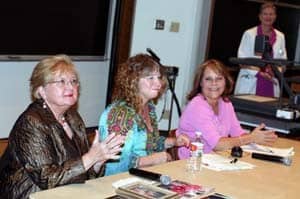Breast Cancer Survivors Share With Future Doctors
Oct. 25, 2010 | Book smarts is one thing; knowing how to cultivate an emotional connection to better understand a disease and treat patients is quite another. Introducing the latter to first-year University of Arkansas for Medical Sciences (UAMS) medical students was the focus of a two-part lecture by Laura Hutchins, M.D., a professor and director of the Division of Hematology/Oncology in the UAMS College of Medicine, Oct. 19. Hutchins spent the first half of the lecture giving the packed auditorium of students a general overview of breast cancer, before introducing the group to a panel made up of three of her former or current patients who represent three different phases and eras of battling the disease. “Students can study medicine and have their text books memorized from front to back all they want,” said James Graham, M.D., associate dean for undergraduate medical education in the UAMS College of Medicine. “But what’s equally important is putting a face and a name to a disease and using that to better interact with patients.” The panel Hutchins handpicked took turns telling their stories from diagnosis to treatment before taking several questions from students. LuEllen Treadway, who just celebrated her 70th birthday, was diagnosed with breast cancer in 1978. She said times have changed and breast cancer has become less taboo to talk about openly since her diagnosis. “I went through this in a time when people just weren’t comfortable talking about it with their doctors, let alone in front of an audience like this,” said Treadway, who went on to help found the Winthrop P. Rockefeller Cancer Institute Auxillary and still volunteers there weekly. “What helps me to this day is to try to give back. If there’s one thing you future doctors should take away from this is to know and understand how much of a life-changing event it is to tell someone they have breast cancer.” Maria Hill, 42, is a 14-year breast cancer survivor who says doctors can offer patients better treatment by forging a more personal relationship with them. “Look them in the eye and make sure they understand what you’re telling them,” Hill said. “I wanted someone to try to understand how that was going to affect me and my family just as much as I wanted to hear what was happening to me in medical terms.” Tina Roark, who was diagnosed in 2007 and is still getting weekly chemotherapy treatments, emphasized to students the important role family history can play in diagnosing patients. Roark knew she had a “long line of cancer” in her family, and after she was diagnosed she took advantage of emerging genetic testing procedures for her kin. “Family history plays an extremely large part in knowing what you might be looking for or what your patients can expect,” Roark said. “A lot of information is available now that can have an effect on treatment and life after treatment.” Hutchins said the Introduction to Clinical Medicine students should have benefited from hearing her patients’ stories. “When there’s a name, face and a heartfelt story behind a disease, it tends to resonate more than flipping through some slides on a PowerPoint presentation,” Hutchins said. “Hopefully some of the things they heard today will stick with them as they progress through their education and begin one-on-one interactions with patients.” |
